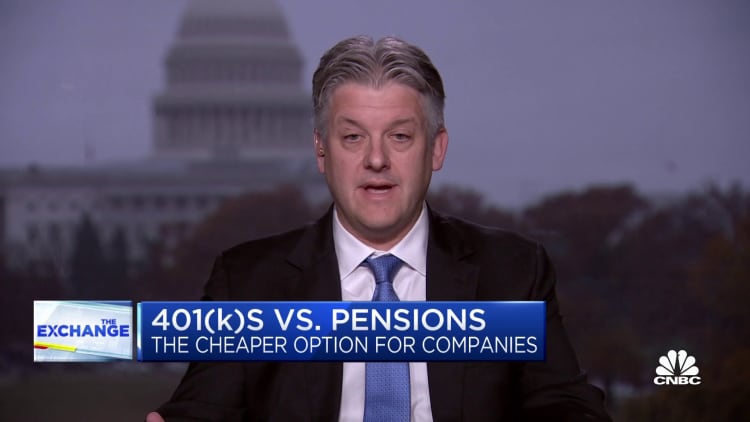Sturti | E+ | Getty Images
A shift from pensions to 401(k) plans has made workers responsible for ensuring they have enough money to live on in retirement.
New research shows some Americans who are on the brink of retirement are nowhere close to ready to funding that goal, with almost half of individuals 55 and older having no retirement savings, according to a Senate report released last week.
Most Americans — 79% — now agree there is a retirement crisis, up from 67% in 2020, according to a new report from the National Institute on Retirement Security. Meanwhile, more than half of Americans — 55% — are worried they won’t be able to achieve financial security in retirement.
Younger investors have a unique opportunity to avoid that dilemma, according to experts who testified at a Senate hearing last week.
More from Personal Finance:
78% of near-retirees failed or barely passed a basic Social Security quiz
Why Social Security beneficiaries may owe more taxes on benefits
62% of adults 50 and over have not used professional help for retirement
The reason comes down to compound interest — the money earned on interest — that Albert Einstein reportedly called “the most powerful force in the universe.”
The more time you have to invest toward a goal, the more the money can compound or grow. Investors who start early may need to put down less money than those who begin later to reach a desired amount.
“Starting earlier obviously makes the math work much better,” Dan Doonan, executive director at the National Institute on Retirement Security, said during the Senate hearing.
Proposals to start wealth accumulation earlier
Lawmakers on both sides of the aisle have introduced bills to help make it possible to get started saving for retirement and building wealth earlier.
One bipartisan proposal — the Helping Young Americans Save for Retirement Act — introduced by Sens. Bill Cassidy, R-La., and Tim Kaine, D-Va., would lower the age for young workers to participate in certain workplace retirement plans to 18 from 21, giving them three additional years’ opportunity to save and for interest to compound.
Another bill — the 401Kids Savings Act, led by Democratic Sens. Bob Casey of Pennsylvania, Chuck Schumer of New York and Ron Wyden of Oregon — would create savings accounts for all children starting at birth, with federal support for low- and moderate-income families. Once a child reaches age 18, they would be able to use the funds toward higher education, starting a small business, purchasing a home or retirement.

“Starting to save at birth also means families can put the market to work for them, leading to compound savings and greater assets later in life,” Casey said during the Senate hearing.
By starting from birth, individuals may accumulate almost $473,000 more toward retirement compared with if they started at 32, according to research from the Aspen Institute.
Earlier enrollment in retirement accounts could lead to “huge progress,” noted Eric Stevenson, president of Nationwide Retirement Solutions, who testified at the Senate hearing.
“If we auto-enrolled everyone at age 21 when they graduated from college, we wouldn’t have a crisis,” Stevenson said.
How young investors can get started now
Workers who want to get started investing toward retirement earlier do not necessarily need to wait for new legislation to be passed.
Young individuals of any age who have compensation — such as wages, salary or tips — are eligible to invest in an individual retirement account. Experts are particularly keen on Roth IRAs, which you fund with post-tax dollars, for young workers.
Investors younger than 50 can contribute up to $7,000 to a Roth IRA in 2024. Of note, younger workers with income less than that threshold can only contribute up to the amount they earn. Parents or grandparents who contribute on a young worker’s behalf are also limited to how much the young worker earns.
Opening a Roth IRA early helps start what is known as the five-year rule, when withdrawals from earnings may be taken tax- and penalty-free. To qualify, five years must have elapsed between the tax year of the first Roth IRA contribution and earnings withdrawal. You must also be at least age 59½.
Money contributed to Roth IRAs can always be taken out without penalties.
“The greatest money-making asset any person can possess is time, and young people have more of it than anyone,” Ed Slott, an IRA expert and certified public accountant, previously told CNBC.com.
“They should capitalize on that time,” he added.
Experts who testified at last week’s Senate hearing on retirement agreed.
“We should start with wealth and accumulate it,” said Teresa Ghilarducci, professor of economics at The New School for Social Research and author of the book, “Work, Retire, Repeat: The Uncertainty of Retirement in the New Economy.”
Don’t miss these stories from CNBC PRO:

